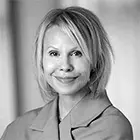Samara Cohen:
Women are feeling more confident in their financial futures and are embracing risk taking in their investments. According to a new survey of over 2000 women that iShares conducted with theSkimm. Hi, I'm Samara Cohen, chief investment officer of ETF and index investments at Blackrock. I've spent my career focused on improving market access for all types of investors, and I'm very encouraged by the survey results, which show 71% of women feel confident in their ability to make financial decisions, and two thirds report their confidence has increased in recent years.
Women are risk aware and consider investing to be the biggest pathway to grow their wealth. 75% say they have moderate to aggressive risk tolerance, and many say they're prepared to take risks in their own lives, like retiring early or changing careers if they meet their financial goals. Over half, 56% say they work with an advisor, private banker or another type of financial professional to manage their portfolios.
This last point really speaks to me because in my experience, asking for help is a sign of strength.
Women continue to face obstacles. On average, we earn lower wages than men, lose income due to caregiving responsibilities, and live longer. So our money needs to work harder for us. And the more the financial industry can expand market access through products like exchange traded funds, the more we can help improve outcomes for all types of investors.
I'm proud of the progress women have made in taking control of their financial journeys, and extremely proud of the investment tools and resources iShares provides to help all investors pursue their financial goals. Please go to iShares.com to learn more about the survey and thanks for watching.
Visit www.ishares.com to view a prospectus which includes investment objectives, risks, fees, expenses and other information that you should read and consider carefully before investing.
Samara Cohen Investing involves risk including possible loss of principal.
Disclosures:
TheSkimm and iShares conducted an online survey of 2,054 U.S. women ranging in age and household income and investable assets in January 2025.
Sources: US Census Bureau, “Current Population Survey: PINC-O5. Work Experience-People 15 Years Old and Over, by Total Money Earnings, Age, Race, Hispanic Origin, Sex, and Disability Status: 2024; Department of Labor “Lifetime Employment-Related Costs to Women of Providing Family Care,” May 11, 2023; Center for Disease Control, ‘Mortality in the United States' 2022.
Investing involves risk, including possible loss of principal.
Buying and selling shares of ETFs may result in brokerage commissions.
This material contains general information only and does not take into account an individual's financial circumstances. This information should not be relied upon as a primary basis for an investment decision. Rather, an assessment should be made as to whether the information is appropriate in individual circumstances and consideration should be given to talking to a financial professional before making an investment decision.
Prepared by BlackRock Investments, LLC, member FINRA.
BlackRock is not affiliated with theSkimm.
© 2025 BlackRock, Inc. or its affiliates. All Rights Reserved. BLACKROCK and iSHARES are trademarks of BlackRock, Inc. or its affiliates. All other trademarks are those of their respective owners.
iCRMH0325U/S-4295629

